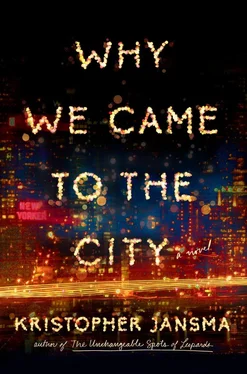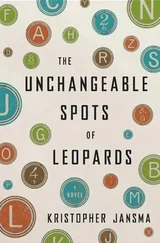4
Van Winkle’s turned out to be a seedy dive bar, covered from ceiling to floor in stickers for punk rock bands, half of which, William imagined, had long ago ceased to exist. There was a stage in the very back, and as he sat at the bar sipping a cup of burned coffee, he tried to imagine a teenage Irene, pink streaks in her hair, diving the stage. He imagined her there with a group of forgotten friends, on whose couches she’d once crashed, making the pilgrimage from wherever they’d come from originally to the anonymous Lower East Side, doing what she had to do to forget the home she’d left behind.
Not exactly eager to go back home (having now received a third message from his mother), William pulled out the address book and, feeling invigorated, began to dial.
First he tried someone named Geoffrey Irving, in Tarrytown, but he wasn’t available. According to his half brother, who answered the phone, Geoffrey was serving ten years in Sing Sing. Maybe he had known an Irene or a “Reeny” once, but William would have to go up there to ask him. He thought he probably would not. Instead he ordered a fresh coffee and asked the Cobalt 7 to look up Geoffrey Irving’s record, which seemed to involve stolen cars and an arrest in 2002, which was at least a year after Irene had ended up in Ithaca. In any case, he was their age and thus too young to be Irene’s father.
William moved on to Ed Simpson of St. Louis, Missouri, a retired train engineer who was happy to pause The Price Is Right to talk a moment. Mr. Simpson remembered a girl named Renee who had once dated his son, Ed Simpson, Jr., now Colonel Ed Simpson, Jr., presently off completing his third tour in Afghanistan. William thanked the man and asked him to thank his son for his service before moving on to the next name in the book.
No one picked up the phone at the home of Sally Paulson of Rochester, but when he looked her up on the Cobalt 7, he found a picture on the staff page of the Maquokeeta Farm in New Hope. He remembered Irene mentioning once working on a farm there. But Sally was African American and so probably not likely to be Irene’s mother.
He couldn’t get through to anyone at the number listed for Anthony Lemon, of Antwerp, Ohio. Then he had three more dead ends in a row with Evelyn Cross of Key West; Mary Winter of Mary Winter’s Garden Center in Houston; and finally Poppy Daniels (gender unknown) of West Virginia.
William was just about to give up and surrender to the fourth call from his mother, when he tried Mr. Bernard Wyckoff, of the Pruder Pools and Aquatic Center in nearby Brighton Beach, who picked up the phone and said that, yes, he had an outstanding order for someone named Irene Richmond, but he was going to need to come down and pick it up himself.
With no other leads, William gladly got into another cab by the bottom of Tompkins Square Park and headed for Brooklyn. On the way he, more reluctantly, decided to call his mother back to let her know he wasn’t dead, lest she start trying to send his own soul abroad.
She sounded strange when she answered. “William, I have to go. Something happened.”
“What is it? Is Dad okay?”
“Your father is fine.” There was a short silence. “Do you remember Chongso Kim?”
William vaguely recalled a pudgy eight-year-old from his father’s congregation, who had thrown up a metric ton of yellow cake at the Annunciation potluck luncheon.
“This morning he snuck out of his room to buy a comic book and was killed by a car crossing Northern Boulevard. Hit and run. Everyone here is very upset. I made sam gae tang to bring over to Mrs. Kim’s.”
William closed his eyes, feeling suddenly sick and trying not to imagine what it would be like to be out on the road in front of the cab he was in, hitting the front fender.
“God. That’s awful. I’m — so sorry. Please tell her I’m sorry.”
He knew his mother would be in a rush now, on her way to a room full of weeping women, carrying her big bowl of stew: Cornish hens stuffed with rice and chestnuts, in a ginseng and garlic broth. She’d add it to the mounting pile of Tupperware in the kitchen and then do what she could, perform the rituals that might comfort the grieving mother, finding the shadow of her son in the haze of incense.
“You didn’t come home last night?”
“Yeah, sorry. I’m — staying with friends in Manhattan. You remember George and Sara?”
Then his mother spoke softly. “She is lost on the road from This World to That World.”
“Who? Sara? No, she’s in the financial district.”
But his mother only said, “You call me back later,” and hung up.
5
William was a little surprised to find the Pruder Pools and Aquatic Center still open in February. Half the other stores along the seaside stretch that he’d walked down had been shuttered for the season. There were only three customers inside when William entered, under a thick yellow haze of cigarette smoke, which not even the chlorine in the air could mask. He approached the only person he could positively identify as an employee, a man whose face was hidden behind a massive, wiry white beard. He was sitting in a deck chair in the back sipping from an orange plastic mug that said LIFE’S A BEACH on the side and reading a historical thriller about the Civil War. When William introduced himself as a friend of Irene Richmond’s, the man extended his hand, then barked, “Aqualad?”
“Sorry?”
With a huge heave, the man rose up out of the deck chair — his giant hand setting down his book so as not to lose his place — and then shifted gears with a flickering smile.
“He’s in the original packaging. Near mint condition. I was going to just ship him, separate from the other stuff, but then her first check bounced and I never heard anything.”
Confused, William followed the man to a door on the side wall by the pool floats, marked PRIVATE, and opened it. Inside, the only light came from eerie, dim halogen spotlights above a long row of display cases. Neatly arranged inside were action figures and dolls of all sorts and sizes, still entombed in original packaging. Maybe a thousand caped, muscular superheroes. Lithe, peach-skinned Barbies. Original Raggedy Anns and Andys. Babies with porcelain faces and glass eyes behind lids that seemed to flutter. The six original American Girls in their boxes. Let us out , their tiny trapped faces seemed to implore.
Mr. Wyckoff tapped a heavy knuckle into one of the cases, at a figure of a boy wearing a tight orange shirt and impossibly tiny green swim trunks. Just like in the comics William had read as a child, he had deep, purple eyes. Aqualad , the packaging announced, Prince of Atlantis. In the background was a wide white beach, spotted with futuristic crystal towers and huge cliffs of diamond. “You’ll never destroy Hidden Valley, Garn Daanuth!” he declared in a flat white speech bubble. Endowed with the Martian power of the Metagene! the corny, 1970s-era packaging promised. What Martians had to do with Atlantis, William could not remember anymore.
“Like I told her, there’s a small crease on the corner of the package.”
William squinted but he barely saw this tiny imperfection. Before he could say anything, Bernard took the boxed figurine out of the case and handed it to him. William turned it over in his hands a moment before he realized it was for him. Right after they’d gotten back together he’d told her the whole story about the kimono and Mi-cha.
He noticed Bernard’s face was practically glowing, now that he was standing so close to the halogen lights. Cheeks, nose, forehead — all were blazing. Long jaggy capillaries branched like rivers. What’d they call that? Gin Blossoms. Like the band. He recalled the blotches Irene had sometimes gotten in harsh sun, or after a second drink, and once upon eating a strong vegetable curry. It started to get especially noticeable after the chemo. “Rosacea,” she had said. “Runs in the family.”
Читать дальше












